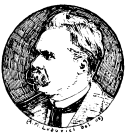
THOUGHTS OUT OF SEASON
PART ONE
DAVID STRAUSS, THE CONFESSOR
AND THE WRITER
RICHARD WAGNER IN BAYREUTH
By
FRIEDRICH NIETZSCHE
TRANSLATED BY
ANTHONY M. LUDOVICI

The Complete Works of Friedrich Nietzsche
The First Complete and Authorised English Translation
Edited by Dr Oscar Levy
Volume Four
T.N. FOULIS
13 & 15 FREDERICK STREET
EDINBURGH: AND LONDON
1910
CONTENTS.
EDITORIAL NOTE
NIETZSCHE IN ENGLAND (BY THE EDITOR)
TRANSLATOR'S PREFACE TO DAVID STRAUSS
AND RICHARD WAGNER IN BAYREUTH
DAVID STRAUSS, THE CONFESSOR AND THE WRITER
RICHARD WAGNER IN BAYREUTH
EDITORIAL NOTE.
The Editor begs to call attention to some of the difficulties he hadto encounter in preparing this edition of the complete works ofFriedrich Nietzsche. Not being English himself, he had to rely uponthe help of collaborators, who were somewhat slow in coming forward.They were also few in number; for, in addition to an exact knowledgeof the German language, there was also required sympathy and a certainenthusiasm for the startling ideas of the original, as well as aconsiderable feeling for poetry, and that highest form of it,religious poetry.
Such a combination—a biblical mind, yet one open to new thoughts—wasnot easily found. And yet it was necessary to find translators withsuch a mind, and not be satisfied, as the French are and must be, witha free though elegant version of Nietzsche. What is impossible andunnecessary in French—a faithful and powerful rendering of thepsalmistic grandeur of Nietzsche—is possible and necessary inEnglish, which is a rougher tongue of the Teutonic stamp, andmoreover, like German, a tongue influenced and [Pg viii]formed by an excellentversion of the Bible. The English would never be satisfied, asBible-ignorant France is, with a Nietzsche à l'Eau de Cologne—theywould require the natural, strong, real Teacher, and would prefer hisoutspoken words to the finely-chiselled sentences of the raconteur. Itmay indeed be safely predicted that once the English people haverecovered from the first shock of Nietzsche's thoughts, their biblicaltraining will enable them, more than any other nation, to appreciatethe deep piety underlying Nietzsche's Cause.
As this Cause is a somewhat holy one to the Editor himself, he isready to listen to any suggestions as to improvements of style orsense coming from qualified sources. The Editor, during a recent visitto Mrs. Foerster-Nietzsche at Weimar, acquired the rights oftranslation by pointing out to her that in this way her brother'sworks would not fall into the hands of an ordinary publisher and hisstaff of translators: he has not, therefore, entered into anyengagement with publishers, not even with the present one, which couldhinder his task, bind him down to any text found faulty, or make himconsent to omissio